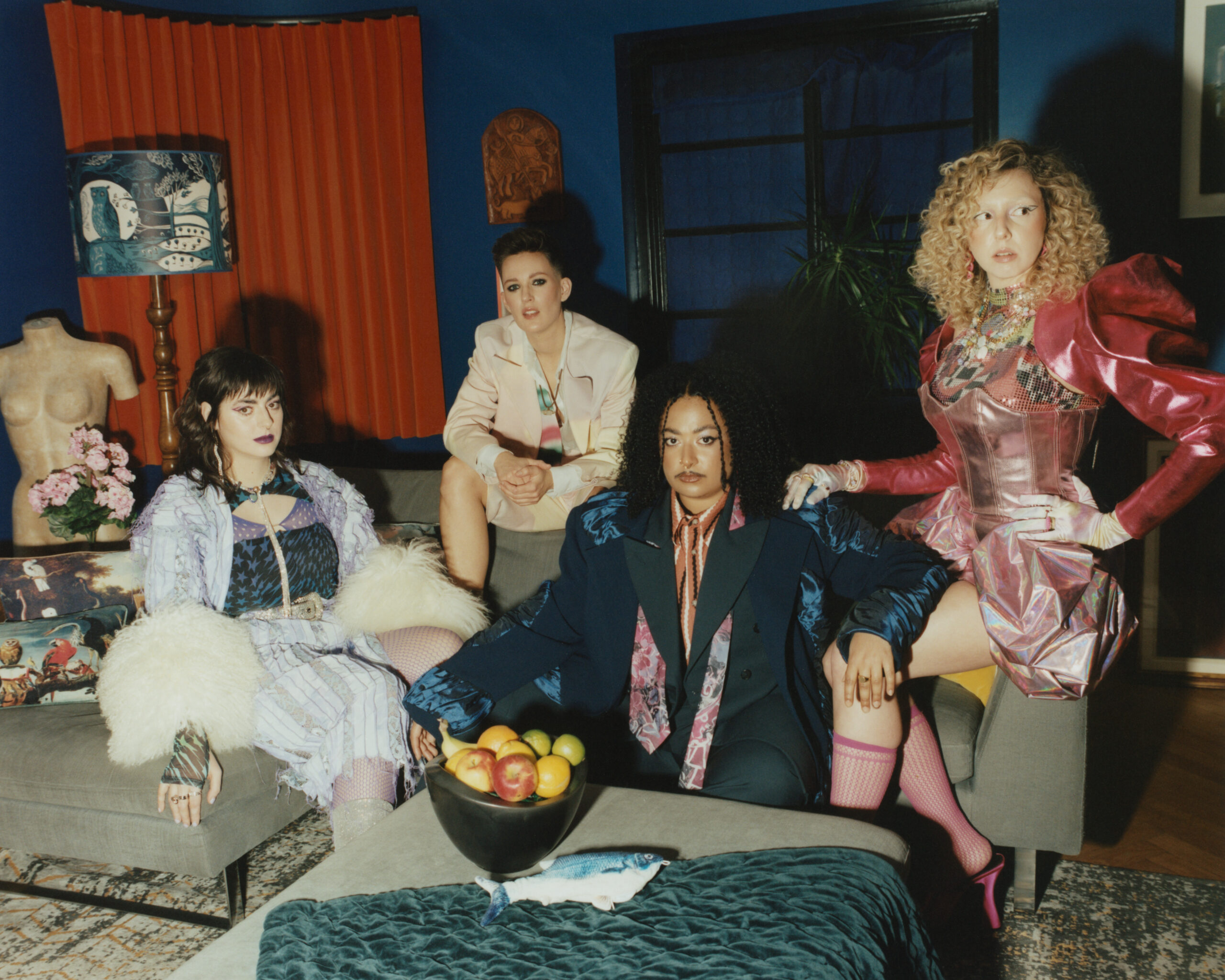
Holly Whittaker
October 13, 2023| Dan Hillier |FEATURES

Doom Loop: Track By Track with Dream Nails
There’s plenty of brilliant bands kicking toxic masculinity out the punk scene in favour of a more inclusive and joyous space. But as their new record Doom Loop highlights, Dream Nails are far more than just another band.
Comprised of Anya Pearson (Guitar), Mimi Jasson (Bass), Ishmael Kirby (Vocals) and Lucy Katz (Drums), since their inception the queerpunk quartet have been a beacon of hope, joy and change. As seen within their 2020 self-titled debut, the collective harness the power of punchy and zealous punk to combat the injustices within our society and to offer resite from it’s horrors. However, the band and their art do more just merely highlight such issues whilst idly calling on one to take action alone.
Instead, Dream Nails actively invite listeners to join the community they have carved out, welcoming fans and listeners alike to partake in their celebrations of queer joy and righteous musical protests. This is what separates Dream Nails from their passive peers in the scene. They are more than just a band; they are a community for one and all, and Doom Loop is the invitation to join them.
Released via Marshall Records, Doom Loop see’s the punk collective expanding their musical horizons whilst reaching out their arms in fellowship. Across the ten tracks that form the record, Dream Nails offer ruminations on radicalisation, authoritarianism, cancel culture, masculinity and the viscous cycles that shape our existence – both mentally and societally. However, this is not a record of outright despair. Akin to the band’s ethos, this record is a life-affirming collection of songs that inspire one to the join the band in making the world a better place whilst finding joy and catharsis in collectiveness.
Truthfully, it’s a cordial and vibrant proposal to join the band’s hand in community and to fight against unjust patriarchal systems, rampant injustices and outdated social constructs together as one. And with that in mind, we got in touch with Dream Nails to breakdown Death Loop track by track.
Good Guy
Ishmael: “‘Good Guy’ is the fake ID used by men used to earn trust, to excuse, to placate. The song makes the point that toxic masculinity is systemic. The lyrics are “It’s not a lone wolf, it’s the whole damn pack. It’s not a bad apple, it’s the whole damn tree”. We see a ‘Good Guy’ a mask, a boys’ club, a dance, a game.”
Lucy: “Musically this song is inspired by Queens of the Stone Age and New York post-punk band Gustaf. It’s a bold statement of intent about this chapter of Dream Nails.”
Femme Boi
Ishmael: “Ultimately this song started as a catchy hook; a trans daydream about the possibility of the power I could hold as a boy expressing femininity. It felt important that writing a song centring gender-euphoria comes from the same place as any other song does, just wanting to hum it on a summer’s day. Growing up in an environment that failed to nurture my trans-national queerness was tough, but I’ve used that pressure to write this song, to validate all the things about me that I couldn’t express back then. I’m so grounded in my gender euphoria these days, that the song is a celebratory revenge for me.”
Ballpit
Lucy: “This song is about having fun for the sake of it. It’s about the pursuit of hedonism as a radical act. It’s easy to be bubbling 24/7 with anger, but part of breaking through the doom loop is learning how to have self-compassion, to carve out moments and spaces where we can play and simply exist. ESG are one of my favourite bands, and were a huge inspo for this song. What’s cooler than that grimy New York punk-funk swagger? I’ll wait. The chanting of ‘I need, I want’ might sound insouciant and carefree, but this song is as political as any of our others, it just lets the sleazy sticky-floor disco vibe shine through a little brighter.”
Mimi: “The story of this song is that we were on tour having just played a rather underwhelming gig in Liverpool and were just about to jump in the van, tired and depleted, when Anya started begging everyone else to check out this adult ballpit across the road, aptly named Balls Deep. She was honestly desperate to go. We caved, and ended up spending an ecstatic hour surrounded by “sticky coloured plastic. “Drowning in colour” is the ultimate goal.”
Geraniums
Anya: “Though we grew up on different continents, me and Mimi both shared the experience of being excluded from all-male rock bands at school. We both played the guitar well after teaching ourselves by listening to Green Day, but we didn’t really have the opportunity to join bands – that was the realm of the confident teenage boys in baggy nirvana hoodies. We felt like we would always be destined to stand in the audience cheering them on. The song is a coming-of-age story. It starts at the age of 12, sitting in your garden and listening to a bass drum pounding from someone else’s band practice and feeling jealous. But it’s told from the perspective of being older and reflecting on who you were as a kid, who you are now, and the power of gender to lock you inside a cage – especially growing up in the toxic noughties.”
Related: Dream Nails – Doom Loop | Album Review
Monster
Lucy: “As a band, we are so sick of cancel culture. This song is about how it brings out the monster in all of us. Part of breaking the doom loop is seeing the humanity in everyone. Cancel culture shames people, isolates them, likely worsening the issues that led them to do abusive things. It can be weaponised against people for the wrong reasons. Cancel culture can often be the opposite of justice. We quote ‘Anthem’ by Leonard Cohen in this song: “There’s cracks in everything, that’s how the light gets in”. It’s the idea that everything and everyone is flawed, but that’s what makes us human. There’s still hope despite that. We’ve added a new line, “find the light and crack it open. For this song we were influenced by the modal choices of bands like King Lizard and the Gizzard Wizard, and their heavy riffs. But there’s a dance-y, airy, poppy section. That’s meant to represent the light getting in.”
She’s Cutting My Hair
Mimi: “This is a song about crushing on your hairdresser. It explores the exact moment that Anya knew for sure she was queer, sitting in that salon chair unable to maintain eye contact for more than a second with a very hot hairdresser. Skin fade haircuts are hugly significant to masc presenting women and gender non-conforming people, they’re an act of rebellion, of bravery, and self-knowing. The lyrics in the middle eight section of the song comments on the significance of discovering your queer identity by seeing it reflected in someone else, literally in the mirror of the hair salon.”
Case Dismissed
Ishmael: “This song stemmed from reporting rape and sexual assault cases to the police in lockdown. When I’m in anguish I write and so I took pen to paper and wrote poetry, spoken words, anything that came to mind. I brought this to one of the first writing try outs with Dream Nails and we started working on a song through the lyrics I’d brought. Looking back it was a very raw thing to do to bring that material so fresh as what I wanted to work from. But then again punk music and that experience felt properly connected. This song is a labour of love and pain and recording it was emotional to say the least. Every time I sing it burns. I’m not angry at just the injustice I faced I’m angry at the injustice we all face no matter what gender, sexuality, or even age.”
Prevenge
Anya: “This song originated as a response to the emotions we felt about the UK’s Police, Crime, Sentencing and Courts Act 2022. The law, which is an aberration, gives more power to the police, criminal justice, and sentencing legislation, and it encompasses restrictions on “unacceptable” protests, despite the fact that protesting is our right and part of the healthy functioning of democracy. Governments that are trying to keep people voiceless and powerless because they know that in reality, their power is brittle. Why is it that the planet is run by authoritarian narcissists? How did this happen and how can we stop it? Prevenge is about making your move first. We’re sick of being on defence.”
Sometimes I Do Get Lonely, Yeah
Anya: “I had been wanting to write a song about inceldom for a long time but had struggled to find a way into the subject that didn’t feel superior or heartless. Then I read ‘Men Who Hate Women’ by Laura Bates, and inspired by her research, decided to tell an empathetic story of an incel becoming radicalised.”
Ishmael: “This song reminds us of ‘Stan’ by Eminem. But we didn’t mean to write a rap, it just happened! The implicit antagonist on this album is the incel. They’re stuck in the doom loop more than anyone else. They’re force fed the false promises of hypermasculinity and extinct gender roles, getting high on rape fantasies and violent misogyny while struggling with their own self-hatred. It’s a miserable way to live, but they’re universally mocked and reviled. How can we look beyond that?”
Time Ain’t No Healer
Ishmael: “Being able to be part of the making of this song that Anya wrote has been an honour and it can relate to people in so many different ways. The trauma of life in all its ways doesn’t disappear with time it changes how we feel about depending on the work you do. Why is it expected we forget pain? Or loss? Or Grief? The thing that exists or has happen will always exist. How we relate to it or encounter it is our choice.”
Mimi: “When it came to demo the track, we reached out to our good friend Alex Mackenzie. Anya had written an arpeggiated piano accompaniment inspired by Yann Tiersen and had also been listening to ‘Days Like These’ by Low. I added these ethereal harmonies to Alex’s synths and vocoders and we created a world together that feels like a womb. You can hear a ticking clock that is actually a Kalimba. This song belongs at the end of the album because disrupts the doom loop. It’s about healing and empathy.”



